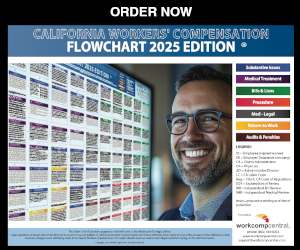Today is
Sunday, July 20, 2025 -
Industry Insights
August 7, 2009
1st DCA limits "Objective Relevant Medical Evidence" Defense
- State: Florida
- - 0 shares
By Michael Rabinowitz
I can understand the facts of Morrow v. Sam's Club and why the First DCA ruled the way they did for that specific case. But, I am worried that the decision can open up a can of worms for a host of issues outside a recommendation for a specialist.
In Morrow, claimant suffered a workers' comp accident that the Employer/Carrier (E/C) accepted as compensable. The E/C authorized initial care with a primary care provider (PCP) who was unable to determine an objective basis for claimant's pain complaints. The treater eventually recommended claimant see an orthopedic specialist to determine whether there is any objective relevant medical evidence. As many of you know, section 440.09(1) does not recognize subjective pain complaints:
The E/C argued this statute applied and that claimant was not entitled to the orthopedic evaluation. The judge of compensation claims (JCC) agreed, but the First DCA reversed and found that the wrong section applied. Instead, the JCC should have applied section 440.13(2)(a); the medical necessity provision. The court found that the PCP needed the ortho eval to determine what the major contributing cause was of claimant's pain complaints. While I agree with the analysis so far, I wholeheartedly disagree with this ruling:
By its plain meaning, this language [section 440.09] applies to compensability of "pain or other subjective complaints."
And thus inviting a slew of litigation because the court just muddied the crystal clear waters of s. 440.09. The coverage provision of 440 has plain meaning that the "objective relevant medical evidence" standard is to be applied to all forms of benefits, hence the preamble which states, "the employer must pay compensation or furnish benefits" and "the injury, its occupational cause, and any resulting manifestations or disability must be established to a reasonable degree of medical certainty, based on objective relevant medical findings."
This means (the way I read it) the E/C can dispute individual medical benefits or disability even for a compensable claim. For example, a claimant has a legitimate slip and fall at work and injures his low back. If claimant begins to have pain complaints in his hands, without any objective relevant medical findings to support that his hand pain is related to the compensable accident, the E/C should not have to pay for treatment or subsequent disability for the hand pain.
The First DCA, with Morrow, is saying "no, section 440.09 only applies to the original determination of compensability." If the E/C already accepted the claim they cannot use s. 440.09 to parcel out compensability. Now, I maybe overreacting to this case, but at the very least the decision invites litigation since claimant attorneys will be more aggressive when E/C's apply this statute.
A workers' comp claim is more than just the initial picking up of the claim. Along the way of treatment, there are numerous possibilities of how the claim will go. Just because an E/C picks up a claim initially should not preclude it from denying tangential treatment or disabilities that are unrelated to the original accident and injury.
Once again, I advise employers and carriers to lock down what specific injuries claimant reports via the initial incident report. A recorded statement is ideal since it locks down the exact disability you are dealing with. This is the best way to avoid having to deal with non-related disabilities should claimant assert them without any objective relevant medical evidence.
======
Michael G. Rabinowitz is an an attorney at Banker Lopez Gassler in Tampa, Fla. This column was reprinted with his permission from his blog, http://workerscompblog.wordpress.com/
======
I can understand the facts of Morrow v. Sam's Club and why the First DCA ruled the way they did for that specific case. But, I am worried that the decision can open up a can of worms for a host of issues outside a recommendation for a specialist.
In Morrow, claimant suffered a workers' comp accident that the Employer/Carrier (E/C) accepted as compensable. The E/C authorized initial care with a primary care provider (PCP) who was unable to determine an objective basis for claimant's pain complaints. The treater eventually recommended claimant see an orthopedic specialist to determine whether there is any objective relevant medical evidence. As many of you know, section 440.09(1) does not recognize subjective pain complaints:
The employer must pay compensation or furnish benefits required by this chapter if the employee suffers an accidental compensable injury. . . arising out of the work performed in the course and the scope of employment. The injury, its occupational cause, and any resulting manifestations or disability must be established to a reasonable degree of medical certainty, based on objective relevant medical findings. . .Pain or other subjective complaints alone, in the absence of objective relevant medical findings, are not compensable. For purposes of this section, "objective relevant medical findings" are those objective findings that correlate to the subjective complaints of the injured employee and are confirmed by physical examination findings or diagnostic testing.
The E/C argued this statute applied and that claimant was not entitled to the orthopedic evaluation. The judge of compensation claims (JCC) agreed, but the First DCA reversed and found that the wrong section applied. Instead, the JCC should have applied section 440.13(2)(a); the medical necessity provision. The court found that the PCP needed the ortho eval to determine what the major contributing cause was of claimant's pain complaints. While I agree with the analysis so far, I wholeheartedly disagree with this ruling:
By its plain meaning, this language [section 440.09] applies to compensability of "pain or other subjective complaints."
And thus inviting a slew of litigation because the court just muddied the crystal clear waters of s. 440.09. The coverage provision of 440 has plain meaning that the "objective relevant medical evidence" standard is to be applied to all forms of benefits, hence the preamble which states, "the employer must pay compensation or furnish benefits" and "the injury, its occupational cause, and any resulting manifestations or disability must be established to a reasonable degree of medical certainty, based on objective relevant medical findings."
This means (the way I read it) the E/C can dispute individual medical benefits or disability even for a compensable claim. For example, a claimant has a legitimate slip and fall at work and injures his low back. If claimant begins to have pain complaints in his hands, without any objective relevant medical findings to support that his hand pain is related to the compensable accident, the E/C should not have to pay for treatment or subsequent disability for the hand pain.
The First DCA, with Morrow, is saying "no, section 440.09 only applies to the original determination of compensability." If the E/C already accepted the claim they cannot use s. 440.09 to parcel out compensability. Now, I maybe overreacting to this case, but at the very least the decision invites litigation since claimant attorneys will be more aggressive when E/C's apply this statute.
A workers' comp claim is more than just the initial picking up of the claim. Along the way of treatment, there are numerous possibilities of how the claim will go. Just because an E/C picks up a claim initially should not preclude it from denying tangential treatment or disabilities that are unrelated to the original accident and injury.
Once again, I advise employers and carriers to lock down what specific injuries claimant reports via the initial incident report. A recorded statement is ideal since it locks down the exact disability you are dealing with. This is the best way to avoid having to deal with non-related disabilities should claimant assert them without any objective relevant medical evidence.
======
Michael G. Rabinowitz is an an attorney at Banker Lopez Gassler in Tampa, Fla. This column was reprinted with his permission from his blog, http://workerscompblog.wordpress.com/
======
Advertisements
Columns
- Paduda: What's Happening in Golden State Work Comp? 07/18/25
- CAAA: Fireworks Warehouse Blast Exposes Flaws in Safety, Oversight, Accountability 07/16/25
- Gelman: Asbestos Ban Is a Win for Workers 07/14/25
- Snyder: Mediation Confidentiality 07/11/25
- Snyder: Settle and Sue: Don't Let It Happen to You 07/09/25
- Kamin: State Senate Committee to Consider SIBTF Bill 07/07/25
- Anders: Self vs. Professional MSA Administration: Which Is Right for the Injured Worker? 06/30/25
- Geaney: Court Affirms Finding of Police Officer's Joint Employment 06/27/25
- Fricker: A New Era for Comp Subrogation 06/25/25
- Kamin: AI for HR Equals Bad Injury Reporting 06/20/25
- Montgomery: Will DWC Ignore New Law? 06/18/25
- Kamin: 4th DCA Clarifies DOI From Date of Knowledge 06/16/25
- Wade: Are the Old Ways Gone? 06/13/25
- Snyder: Trust Your Intuition 06/12/25
- Montgomery: DIR Director Reportedly Resigning 06/11/25
- Gelman: Supreme Court to Review COVID Compensability 06/06/25
- Paduda: WCRI's New Studies 06/05/25
- Moore: 187 Pages of WCRI State Stats 06/02/25
- Paduda: The Gutting of NIOSH 05/30/25
- CAAA: Left in the Smoke 05/28/25
Now Trending
- Workers' Compensation News
-
Calif. LAO: Second
Injury Fund 'No Longer Aligned'
With Legislative…
Posted on Jul 14, 2025
-
Calif.
Commissioner Approves 8.7% Rate
Increase, First Since…
Posted on Jul 15, 2025
-
Calif.
Commissioner Says Rate Hike a
Warning of Growing…
Posted on Jul 17, 2025
-
Calif. Jennifer
Osborn Appointed as DIR…
Posted on Jul 18, 2025Jeffrey Gaines says: “Has she ever tried a case at the WCAB?…”
-
Calif. QME Exam
Scheduled for…
Posted on Jul 16, 2025
-
Minn. High Court
Upholds PTSD Award and Penalty,
Vacates Finding That OSTD Is…
Posted on Jul 18, 2025
-
Ntl. Lawmakers Ask
GAO to Probe…
Posted on Jul 16, 2025
-
Ntl. DOL Reduces
Penalties for Safety…
Posted on Jul 16, 2025
-
Pa. Court Upholds
Employer's Termination of…
Posted on Jul 16, 2025
-
N.M. Court Orders
Recalculation of Sanctions on
Employer for Unfair Claims…
Posted on Jul 14, 2025
Jobs
Upcoming Events
Sep 2-4, 2025
San Diego Elevate Workers' Com
We are thrilled to announce that Early Bird registration is OPEN for ELEVATE« 2025! This year's …
Social Media Links
WorkCompCentral
c/o Business Insurance Holdings, Inc.
c/o Business Insurance Holdings, Inc.
PO Box 1010
Greenwich, CT 06836
(805) 484-0333
Greenwich, CT 06836




No Comments
Log in to post a comment